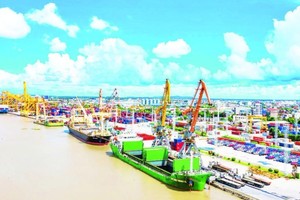In 2024, Vietnam’s export turnover exceeded US$405 billion for the first time, elevating the country to 17th place among the world’s 20 largest economies.
As major global economies introduce highly competitive new trade policies—some even engaging in trade wars—how can Vietnam minimize negative impacts, avoid losses, and continue expanding exports to achieve double-digit growth in the coming years? Reflecting on the lessons from the E5 biofuel investment, the country may find effective solutions for the economy.
Sai Gon Giai Phong Newspaper published a series titled “Biofuel production turns into big debt” from July 9, 2024. Shortly after, a senior petroleum industry official revealed the deeper reasons behind the failure of the E5 biofuel investment. About 15 years ago, in an effort to ensure energy security, protect the environment, and provide a stable market for agricultural products, three ethanol plants—Dung Quat, Phu Tho, and Binh Phuoc—were developed with State capital, totaling over VND5 trillion in investment. In the end, the Phu Tho plant was abandoned and became the subject of a criminal case, while the other two were completed but have struggled to operate.
When Vietnam invested in E5 biofuel production, a sharp drop in fuel prices made the business extremely challenging. Cassava, the raw material for ethanol used in E5 gasoline, became too expensive, making the fuel uncompetitive. In response, PetroVietnam mobilized all resources to push E5 biofuel sales across its system.
Just as the market showed signs of improvement, the US-China trade war escalated, bringing strict tariffs and technical barriers to exports. The US, the world's largest ethanol producer, relied on vast fields of high-yield genetically modified corn, while China, a major ethanol consumer, faced domestic shortages and had to import from the US.
When the trade war began, China raised ethanol import taxes in retaliation against US tariffs, blocking American producers from selling to China. Left with excess supply, US ethanol producers turned to Southeast Asia, including Vietnam, at extremely low prices. Meanwhile, China, no longer importing ethanol from the US, expanded domestic production and increased cassava purchases, driving up cassava prices in Vietnam while ethanol prices plummeted.
Foreign investors in Vietnam’s ethanol sector pulled out, unable to secure raw materials at competitive prices. Today, ethanol projects remain unprofitable, with investors covering losses from other sources, while production plants stand idle—massive structures rusting away.
For Vietnam, the investment in E5 biofuel is one of the most expensive lessons—a direct consequence of the trade war. However, with a highly open economy, risks come with significant opportunities. To adapt, Vietnam must take a broad strategic view, assessing both advantages and challenges to develop an effective response. This is also a chance to restructure the economy for deeper, more sustainable growth.
As an agriculture-rich nation, Vietnam must accelerate its transformation to diversify market access. The Halal market, for example, is enormous, valued in the trillions of dollars. To penetrate this sector, Vietnam must embrace green and clean production, requiring a fundamental shift in farming practices. Meeting Halal standards would also open doors to other high-value markets. At the same time, industrial transformation, particularly in high technology, is essential. While attracting major global corporations is important, Vietnam must also implement phased technology transfer policies to gradually achieve technological self-sufficiency.
While long-term strategies are crucial, immediate action is needed—especially aggressive interest rate cuts to support businesses and individuals. Lower capital costs provide the best opportunity for economic expansion, boosting competitiveness in the long run and strengthening Vietnam’s resilience in global trade conflicts.
























